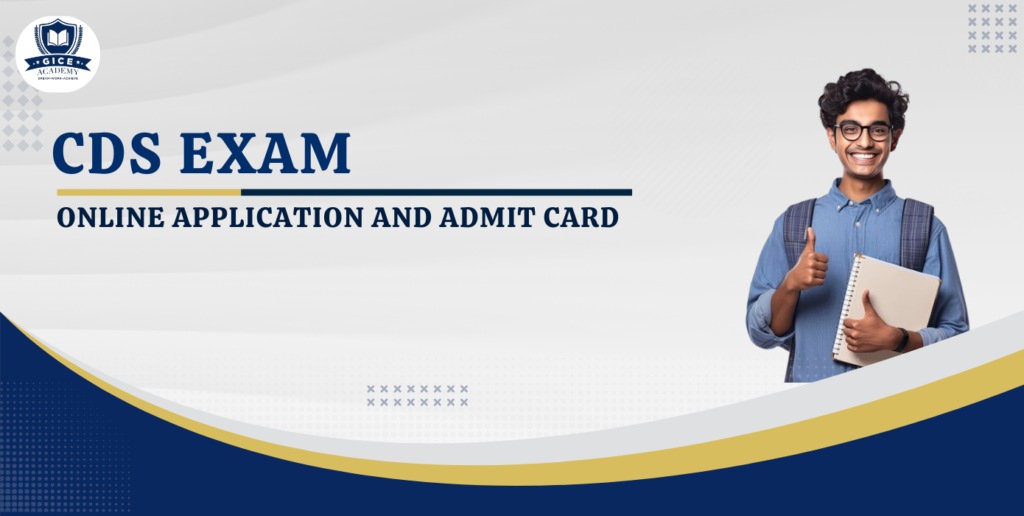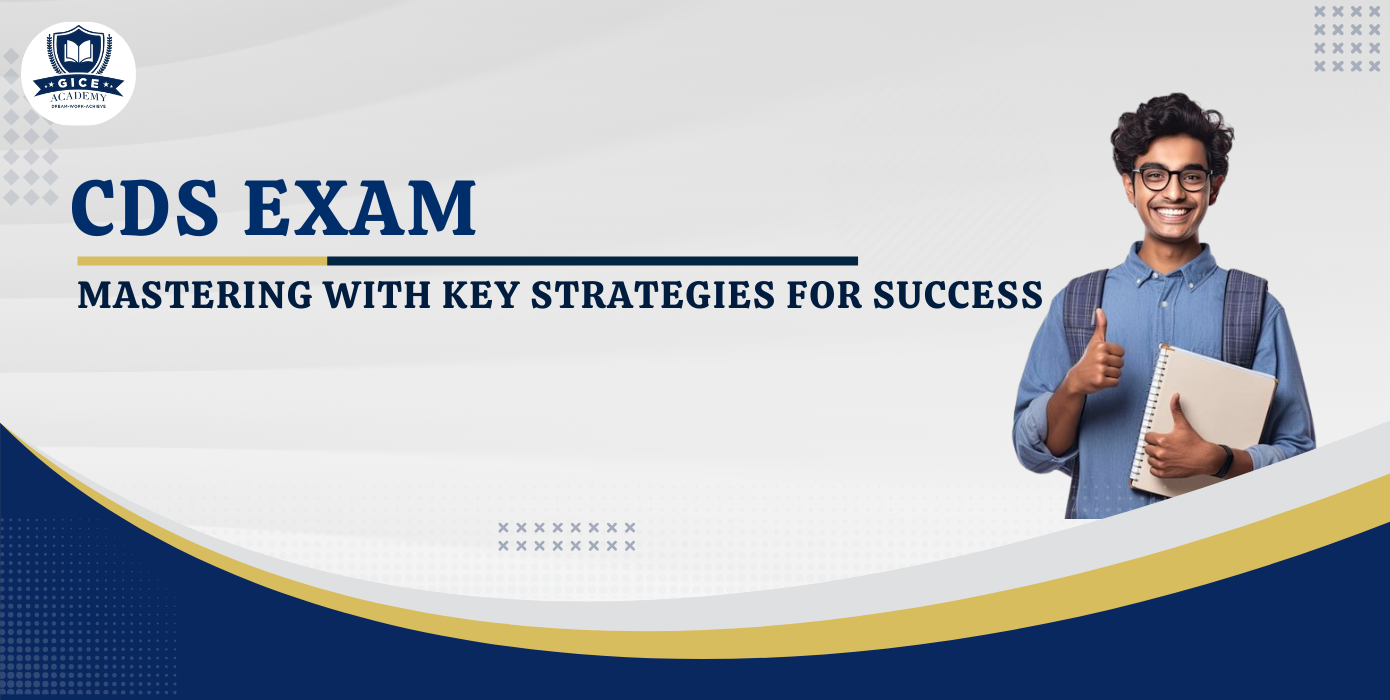Table of Contents
Introduction
The Combined Defence Services (CDS) exam serves as a pivotal gateway for individuals aspiring to join the esteemed ranks of the Indian Armed Forces. This prestigious examination demands rigorous preparation and strategic planning to secure success. Understanding the exam pattern, devising a comprehensive study plan, focusing on subject-specific preparation, mastering time management techniques, and maintaining peak physical fitness are all integral components of effective CDS exam preparation. GICE Academy recognizes the significance of this journey and aims to equip you with essential strategies and insights tailored to help you conquer the challenges of the CDS exam. Our guidance ensures that you are thoroughly prepared to realize your ambition of serving your nation with honor and distinction.
Section 1: Understanding the CDS Exam Pattern
The CDS exam is conducted by the Union Public Service Commission (UPSC) twice a year. It comprises three papers for candidates aspiring to join the Indian Military Academy (IMA), Indian Naval Academy (INA), and Air Force Academy (AFA), and two papers for those aiming for the Officers’ Training Academy (OTA).
For IMA, INA, and AFA:
- English: 100 marks, 2 hours
- General Knowledge: 100 marks, 2 hours
- Elementary Mathematics: 100 marks, 2 hours
For OTA:
- English: 100 marks, 2 hours
- General Knowledge: 100 marks, 2 hours
The CDS exam includes negative marking for incorrect answers, which necessitates careful and accurate answering.
Eligibility Criteria for CDS Exam:
- Age Limit: 19 to 24 years for IMA, INA, and AFA; 19 to 25 years for OTA.
- Education: A degree from a recognized university or equivalent.
- Nationality: Indian citizens.
CDS Exam Important Dates:
- Notification Release: Typically in August and October.
- CDS Application: Begins shortly after notification release.
- Exam Conducted: February and November.
Understanding the structure and requirements of the CDS exam is the first step towards effective preparation. Knowing the exam pattern helps in strategizing your study plan and focusing on the key areas that need attention.
Section 2: Creating a Study Plan
A well-structured study plan is crucial for effective preparation. It ensures that you cover all the necessary topics while also allowing time for revision and practice. Here’s how to create an effective study plan:
Daily Goals:
Dedicate 5–6 hours daily, with breaks to avoid burnout. Divide the time between different subjects to ensure balanced preparation.
Weekly Goals:
Focus on completing specific subjects or topics each week. This helps in tracking progress and staying on course.
Monthly Goals:
Aim to cover entire subjects within a month and ensure regular revision of previously covered topics.
Balancing subjects and ensuring comprehensive coverage are key. Allocate more time to weaker areas while maintaining regular practice across all sections.
Section 3: Subject-wise Preparation Tips
English
The English paper tests your proficiency in grammar, vocabulary, and comprehension. Here’s how to prepare effectively:
Key Areas:
- Grammar, vocabulary, comprehension, and sentence formation.
Recommended Books:
- Wren & Martin, Objective General English by SP Bakshi.
Preparation Tips:
- Read Daily: Develop a habit of reading newspapers, magazines, and books. This will improve your vocabulary and comprehension skills.
- Practice Grammar Exercises: Regular practice of grammar exercises will help you understand the rules better.
- Expand Your Vocabulary: Learn new words daily and use them in sentences to improve retention.
- Solve Previous Years’ Papers: This will help you understand the exam pattern and the types of questions asked.
General Knowledge
The General Knowledge paper covers a wide range of topics, including current affairs, history, geography, politics, the economy, and science.
Key Areas:
- Current Affairs, History, Geography, Politics, Economy, and Science.
Recommended Books for CDS Exam:
- Manorama Yearbook, Lucent’s General Knowledge.
Preparation Tips for CDS Exam:
- Read Newspapers: Stay updated with the latest news and events by reading newspapers daily.
- Follow Current Events: Use online resources and apps to keep track of current affairs.
- Use GK Books: Refer to standard GK books for in-depth knowledge on various topics.
- Revise Regularly: Regular revision is essential to retaining information.
Elementary Mathematics
The mathematics paper tests your understanding of basic mathematical concepts. Here’s how to prepare:
Key Topics:
- Arithmetic, algebra, geometry, trigonometry, statistics.
Recommended Books:
- RS Aggarwal’s Quantitative Aptitude and NCERT Mathematics textbooks.
Preparation Tips:
- Practice Problems Daily: Regular practice is crucial to understanding mathematical concepts.
- Focus on Understanding Concepts: Instead of rote learning, focus on understanding the underlying concepts.
- Solve Previous Years’ Papers: This will help you understand the exam pattern and the types of questions asked.
Section 4: Time Management
Effective time management is crucial for CDS preparation. Here are some techniques to manage your time efficiently:
Prioritizing Topics:
Start with challenging subjects and gradually move to easier ones. This ensures that you have enough time to understand difficult topics.
Study Schedule:
Maintain a balanced routine of study and relaxation to avoid burnout. Allocate specific time slots for each subject and stick to the schedule.
Avoiding Procrastination:
Set clear, achievable goals and stick to your study plan. Break down larger tasks into smaller, manageable chunks to make them less daunting.
Section 5: Practice and Revision
Regular practice and revision are essential to mastering the CDS exam. Here’s how to do it effectively:
Solving Previous Papers:
Solve previous years’ papers to understand the exam pattern and the types of questions asked. This will also help you identify areas that need improvement.
Mock Tests:
Take regular mock tests to build confidence and improve time management. Analyze your performance in these tests to identify weak areas and work on them.
Revision:
Allocate time daily for revision to reinforce learning and retain information. Revise key concepts, formulas, and important topics regularly.
Section 6: Physical Fitness and Medical Test Preparation
Physical fitness is vital for CDS aspirants. The selection process includes a rigorous physical and medical test. Here’s how to prepare:
Daily Exercise:
Include running, strength training, and flexibility exercises in your daily routine. This will improve your overall fitness and stamina.
Balanced Diet:
Maintain a nutritious diet to ensure overall fitness. Avoid junk food and focus on a balanced diet rich in proteins, vitamins, and minerals.
Medical Test Preparation:
Ensure overall health, address any medical issues early, and maintain proper hygiene. Regular check-ups and a healthy lifestyle are crucial.
Section 7: Exam Day Strategies
Preparing for the exam day is as important as the preparation itself. Here’s what to do:
Last-minute Revision:
Focus on revising key points, formulas, and important concepts. Avoid learning new topics at the last minute.
Managing Stress:
Practice deep breathing, stay positive, and avoid last-minute cramming. Stay calm and composed.
Time Management:
Divide your time wisely among sections and attempt easier questions first to build confidence. Ensure that you have enough time to review your answers.
Online Application and Admit Card

Candidates must complete the CDS application process online through the official UPSC website. Keep track of the application deadlines and ensure all required documents are submitted correctly. Once the application is processed, download the CDS admit card from the official website. The admit card is essential for entry into the examination hall, so ensure it is printed and kept safely.
CDS Result
The CDS result is usually declared a few months after the exam. Candidates can check their results on the official UPSC website. The result includes a list of candidates who have qualified for the next stage of the selection process, which is the SSB interview.
Conclusion
Mastering the CDS exam requires a blend of strategic planning, dedicated study, regular practice, and physical fitness. GICE Academy emphasizes the importance of staying motivated, following a structured plan, and believing in your capabilities. With the guidance and resources provided by GICE Academy, along with the right preparation and mindset, success in the CDS exam is within your reach.
Stay tuned for our next blog where we will delve deeper into specific strategies and tips tailored for the Combined Defence Services (CDS) exam. Whether you are aspiring to join the Army, Navy, or Air Force, GICE Academy is committed to helping you achieve your goal of serving the nation with honor and distinction for Combined Defence Services (CDS) exam preparation coaching classes in Thane.
FAQ
What is the eligibility criteria for the CDS exam?
Age Limit: 19 to 24 years for IMA, INA, and AFA; 19 to 25 years for OTA. Education: Degree from a recognized university or equivalent, Nationality: Indian citizens.
How important is the General Knowledge section in the CDS exam?
It carries significant weight, with 100 marks, and covers a broad range of topics.
What are the best books for CDS preparation?
Wren & Martin for English, RS Aggarwal’s Quantitative Aptitude for Mathematics, and Lucent’s General Knowledge.
How can I improve my General Knowledge for the CDS exam?
Read newspapers, follow current events, use GK books, and revise regularly.
What is the role of physical fitness in CDS selection?
It is crucial for the SSB interview and overall selection process.
How should I manage my time while preparing for the CDS exam?
Prioritize topics, maintain a balanced study schedule, and avoid procrastination.
What are some effective revision strategies for the CDS exam?
Solve previous papers, take mock tests, and revise regularly.
How can I stay motivated during my CDS preparation?
Set clear goals, take breaks, and stay positive.
What should I do if I feel stressed before the CDS exam?
Practice deep breathing, stay positive, and avoid last-minute cramming.
How can I improve my English skills for the CDS exam?
Read daily, practice grammar exercises, and expand vocabulary.


